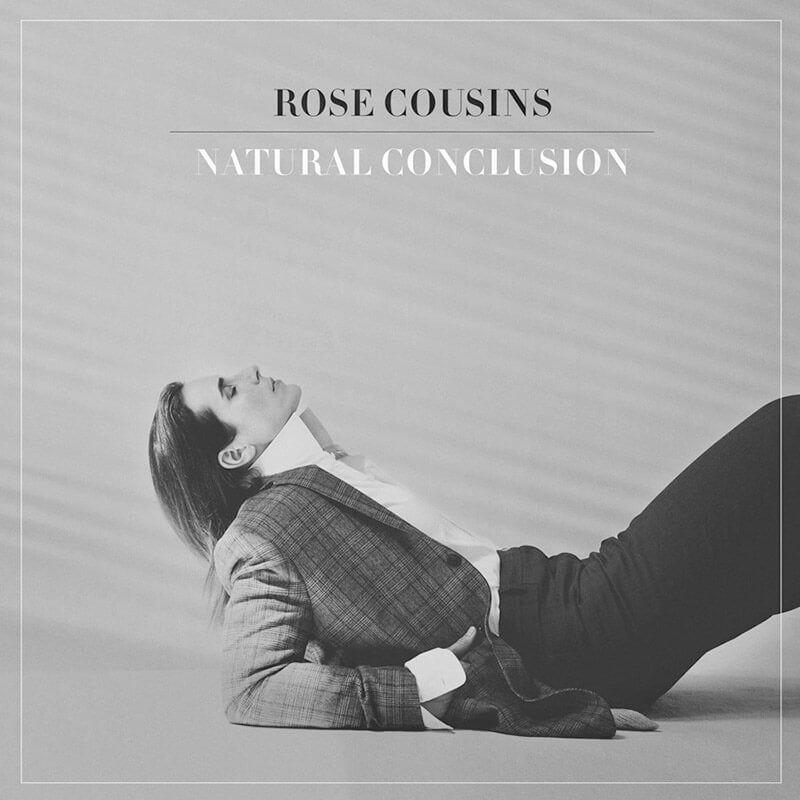“I really believe in not having everything ironed out beforehand,” Rose Cousins tells me. “The magic gets lost in over-determination.” If this is indeed the methodology that brings Natural Conclusion—the Canadian songwriter’s fourth and newest record—into being, fellow musicians might wish to develop a habit for plunging headfirst into the indefinite. Just look at the results it yields. One listen to the record—even one listen to “Chosen,” the centerpiece of Natural Conclusion and its first single—is evidence enough of the magic Cousins mentions.
It’s a skillful sorcery in which she engages; one she’s demonstrated on the lyric and melodic level to astonishing effect in her three previous records—2006’s If You Were for Me, 2009’s The Send Off, and 2012’s We Have Made a Spark, a record that landed the songwriter a Juno Award—but which has never been more apparent and laudable than it is here. Cousins has a preternatural, if not supernatural, ability to capture and render the fraught complexity that exists both between people and within oneself.
“Relationships are the trickiest things we navigate as human beings,” Cousins says. “It’s separate people with their own unique emotional structures—however they were created—attempting to connect with another person who has their own unique emotional structure. And I’m fascinated by people who are doing it successfully.” Indeed, many of the songs on Natural Conclusion are interested in the innumerable ways a relationship might fail or flounder or otherwise deteriorate in the face of that tricky navigation.
This, of course, can be said of a great many—a majority, one could even argue—of songs. It’s what Bonnie Raitt is up to in “I Can’t Make You Love Me;” what Leonard Cohen is tugging at in “Famous Blue Raincoat.” What sets Cousins—and, specifically, this record—apart, however, is her willingness to examine honestly and ruthlessly the role she herself might play in any given relationship’s dissolution. “I am tired and worn thin from healing wounds inflicted by my own scorn/I am at war and I am alone,” she sings on “Chosen,” a song in which Cousins lays bare a frank, distilled worry: “I don’t know if I have what it takes to be chosen.” Of all the striking lines to be found throughout the songs that comprise Natural Conclusion, that’s the one that packs the biggest, most affecting punch.

Rose Cousins, photo by Vanessa Heins
“I’ve been chewing on the feeling within that song for a really long time,” Cousins says, “trying to figure out what might be the source of my own fear and doubt.” The outcome of this variety of auto-ethnography is a stirring, heart-rending song for an audience to engage with, but something additional for Cousins. “After writing it, it was a great release for me, because I understood better what I was feeling,” she says. “I wrote that song and I thought, ‘Shit, that is real, that is as vulnerable as I have ever been and as honest as I’ve ever been.’”
This is the unrelenting ambition of Cousin’s songwriting: to know herself better by virtue of what she finds herself able to disclose in her lyrics. In setting out to write toward an apprehension of why we—often without knowing—circumscribe ourselves, immure ourselves from what has the potential to be unspeakably happy-making, Cousins arrives at a place of insight as capacious and meaningful for her audience as it is for herself. “That, to me, is an endless, constant conversation the songs are having,” she says.
The conversation is taken up elsewhere on the record in a song like “Freedom.” Boosted by the sonorous production, the song has to it an anthemic feeling—and how could it not, with a title like that—in which the speaker seems to be expressing liberation from a suffocating dynamic that has come to permeate and thereby constitute a relationship. But though it may take a few listens to land on—for Cousins’s voice, which this reviewer has described previously in Performer as having the capacity to “lullabize a pack of starved, angry wolves,” is often so arrestingly beautiful and singular as to dominate the initial listening experience—the perceptive listener soon realizes that Cousins is in fact troubling the very notion of what freedom might mean; for what kind of freedom is it that, born of one’s being risk-averse, unfetters one from love? “Here I am sitting with the thing that I want, and missing the thing I had to give up to have it, and isn’t that the fucking rub,” is how Cousins characterizes it.
“Freedom” feels representative of what Cousins’s songs seek to dramatize—or perhaps hypothesize is the better word—which is that love might be defined as nothing more and nothing less than the cultivated practice of embracing one’s own vulnerability and, in tandem, the vulnerability of others. The trick, then, is to enact this embrace without abandoning one’s authenticity. “I’ve spent a lot of time maneuvering and gymnastizing in and around connections,” she says, “but no matter how many times you try—or in which ways you try—to contort yourself in a relationship, it’s just not going to work out. And you’re not honoring yourself if you’re contorting for someone else.”
This disinterest in contortion is embodied not only in what the songs aim to appraise at large, but in the lyrics, too. Though there is no shortage of instances on Natural Conclusion wherein Cousins demonstrates an impressive deftness for lush, lyrical acrobatics—as in a line like “my guts are raw with the lines of a liar” from “Chains,” or “I swear your nerves were thick like trees,” from “Like Trees”—Cousins’s great strength is and always has been the deployment of a language of undecorated candor, stripped of artifice, to impart feeling and meaning. Consider the straightforwardness of a line like “I pushed you away and now you’re all that I need,” from “Lock and Key,” or the bluntness at the heart of “I am my own worst enemy” from the same.
Where other songwriters might seek to shroud the emotion being expressed in esoteric abstraction, Cousins is content to simply say it—to sing it—as it is. This confidence in language—that the words, so long as they are honest, will be good enough—seems the condition of possibility that allows for what is so moving and so admirable about the music Rose Cousins puts out into the world: its unremitting willingness to transmogrify the results of a fearless self-cartography—maps of error, joy, pain, vulnerability, beauty, and everything in between—into songs which, regardless of the emotion or situation being adumbrated, always allow for the maximum passage of light.

Rose Cousins – Natural Conclusion
Standout Track: “Chains”
Follow on Twitter @rosecousins
